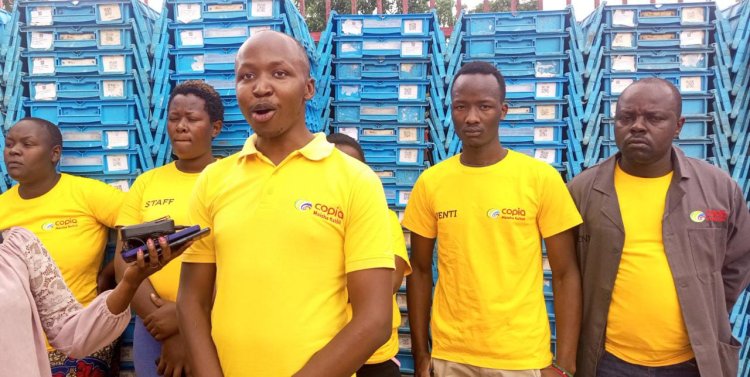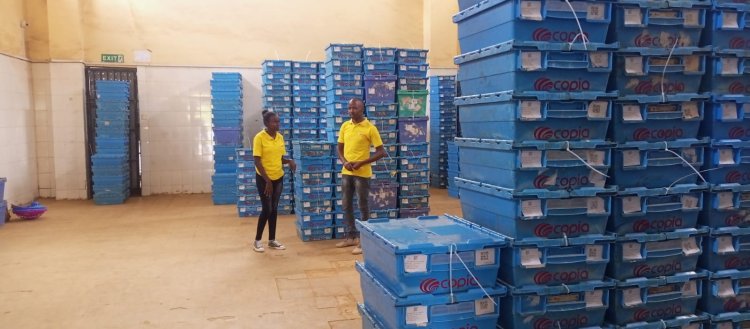E-Commerce Platform Earning Kenyans Ksh50 Million Per Month
Kenya's retail distributor Copia Global reaches out to people in the interior of the Gusii region for more outreach of clients at a grassroots level.

During Covid-19 when the county was battling with the pandemic that forced many businesses to close down, Copia Global came as a reliever to serve the community in ways few can by delivering vital food and household supplies.
Kenya's retail distributor Copia Global reaches out to people in the interior of the Gusii region for more outreach of clients at a grassroots level. The mobile commerce platform and goods distributor has raised Ksh6.2 billion ($50 million) from investors to fund its expansion into the rest of Africa.
Copia is among a group of African start-ups that aim to use information technology to solve the continent's problems, like highly fragmented and informal retail markets.
People living in the remote parts of Kisii were able to access quality household goods at their doorsteps during the festival season after the platform took its services to the villages.

Victor Agona, Copia’s sales manager, Gusii region addressing the press at the shop in Kisii county said the company has identified the need of middle- and lower-class people including vulnerable groups where the majority are women. /VIRALTEAKE.ELIZABETH ANGIRA
Beatrice Mokeira from Enjoro village in Borabu constituency, Nyamira County is one of the 40,000 agents working with Copia Global whereby she links consumers and the company to get their goods delivered.
For many years people in the interior parts of this region had to budget and plan to travel for kilometres to shopping centres or towns to get essential household foodstuffs to use during the Christmas festivities.
Many had a reason to smile after Copia Global products identified the gap of lack of access to goods and provided a platform for consumers for a year now to gain a variety of products that are delivered at their convince.
Copia delivers products to its customers and its aim is to bridge the gap for people who don’t have access to supermarkets or retail shops.
Data from Copia reveals that the platform serves over half a million low to middle-income customers that are based in rural and growing urban centres across various parts of the country. These customers are served by more than 8,000 agents, making it one of the largest e-retail chains in Kenya.
Mokeira says that her customers place their orders through mobile after which she orders them and within 24 hours they pick them up from her shop.
“It is more convenient to the customers it cuts down unnecessary costs like fare that they would have incurred if they were to travel physically,” Mokeira says.
She said when consumers place orders, they also give out their contacts and when their products are delivered, they immediately receive a text message to notify them and they are able to pick their products.
Mokeira further notes that her customers pay for the goods they have ordered before delivery is made, this is when she pays the company either electronically or in cash.
She cited that the company has provided her with the layers of the products and prices, before a customer place an order, he or she checks with it and compares it with the price market, customers don’t pay a delivery fee, it’s the company which delivers freely.
Mokeira is now able to place orders of goods worth Ksh3,000 per day with the highest amount of up to Ksh20,000, especially towards the end month. Paid under commission, she targets to reach more customers from the neighbouring villages for her to make more profit.
She noted that the main challenge they are currently facing is delayed delivery during heavy rains making the roads impassable.
Divinah Barongo also says being a Copia agent is a side hustle, she has a cereal shop beside the road and after giving services to customers they are able to pick their products from here with the day. Barongo gets at least 70 customers per month who place orders and get their goods delivered.
Grace Moraa from Nyaura village, a Customer of Copia for a year now said she enjoys shopping through orders and picks up her goods from the agent who is her neighbour any time after receiving a delivery message.
Moraa shops for household goods such as baking flour, cooking oil, sugar, and soap, which takes her family through the month, which saves her time planning to travel to town to shop in the supermarket or retail shops.
“I don’t have to look for means of transport to get to town to get shopping, with my agent I send her what I want and the money and within a day my goods are delivered,” said Moraa.
Empowering the public
Victor Agona, Copia’s sales manager, Gusii region, said the company has identified the need of middle and lower-class people including vulnerable groups where the majority are women. According to him, they have 40,000 agents in both Nyamira and Kisii counties who are able to link the customers and the company.
“Copia is a problem solver and this was witnessed during COVID-19, this is the time we got many customers and build trust with them,” said Agona on the sale.
Agona said the company makes sales of Ksh50 million per month from Kisii and Nyamira counties where they serve at least 30,000 customers.
Dr Abel Mokoro, an economist, says that a well-established e-commerce market provides opportunities to rural communities while also empowering them with a feeling of entitlement and sustained economic engagement.
Mokoro cites that it creates jobs, leads to industry growth in rural areas, and allows rural sellers to conduct larger and more active business, reiterating that businesses must understand the customers' requirements and gradually achieve operational excellence using the proper techniques.
“Operational excellence involves applying the right digital tools and processes to increase central and local efficiency, decrease operating costs, and empower staff to deliver higher-value services,” he says.
While most online shops have already embraced technology extensively, there are newer solutions that take efficiency and quality improvements to the next level by radically reducing the need for manual and error-prone tasks.
The company is empowering women to be their agents and earn extra coin since is not a full-time job with 81 per cent of their agents being women and contributing up to 75 per cent of their well-being.

Copia delivery shop in Kisii county. /ELIZABETH ANGIRA.VIRALTEAKE
Using mobile applications, a network of over 40,000 agents, and an innovative last-mile logistics system, Copia provides access to essential products to over 1.9 million customers across Kenya and Uganda.
The linkage between middle and low-income consumers
Copia leverages cutting-edge technology that links middle and low-income consumers to a variety of quality products that are delivered at their convenience. Consumers can thus access life-enhancing products at affordable prices, saving them from travelling to urban retail centres or from simply not having access to them.
Josephine Kemunto a customer says that she has cut down on unnecessary expenditures which she used to incur when travelling to the market to purchase goods. She urges other women to embrace Copia since is more convenient and affordable to reach grass root level.
Copia can deliver to the most remote locations, even in places with poor road infrastructure or lack of addresses, at no additional cost to the customer
Committed to operating in an environmentally responsible manner to reduce our impact on climate change, conserve natural resources, operate in compliance with environmental regulations and continually improve in doing so.

 Elizabeth Angira
Elizabeth Angira 




